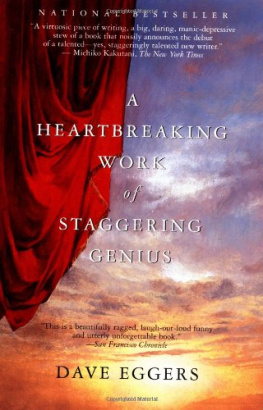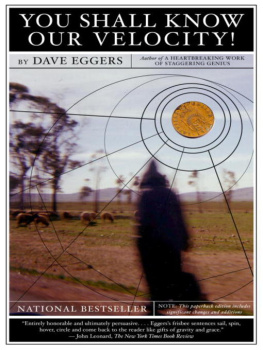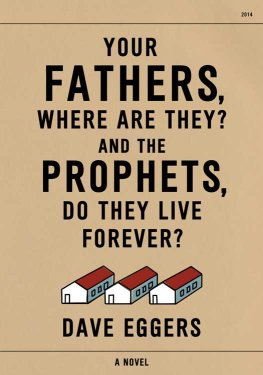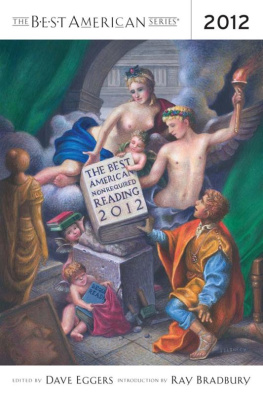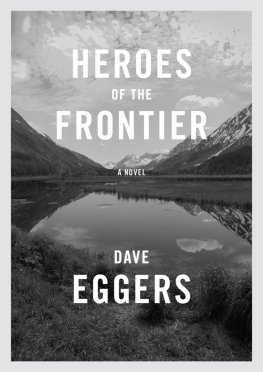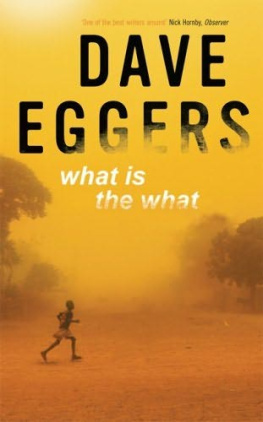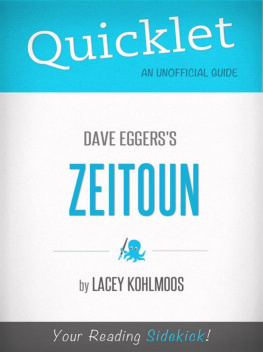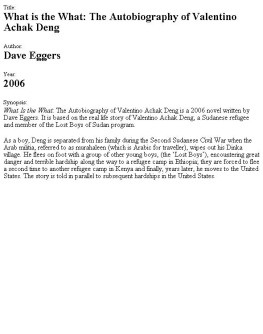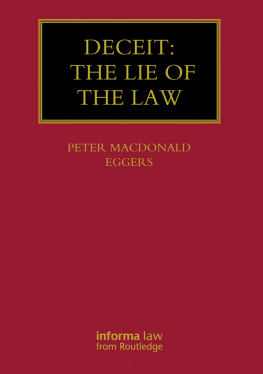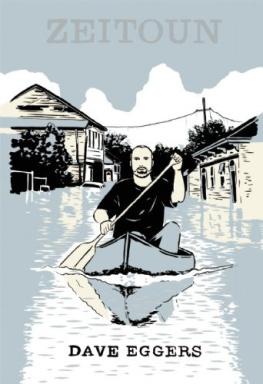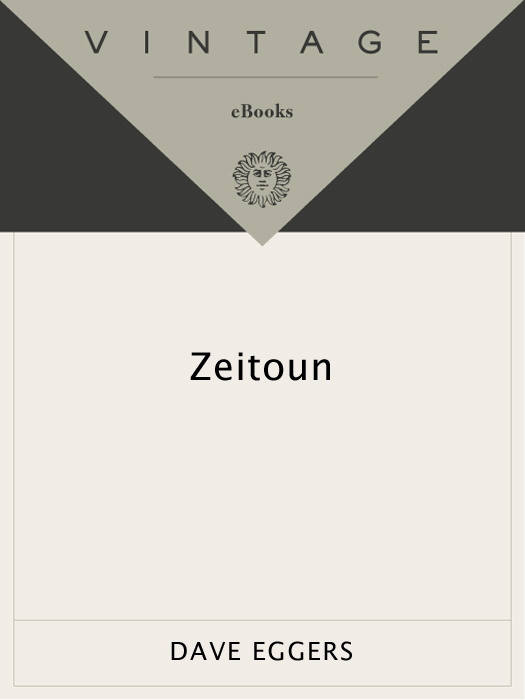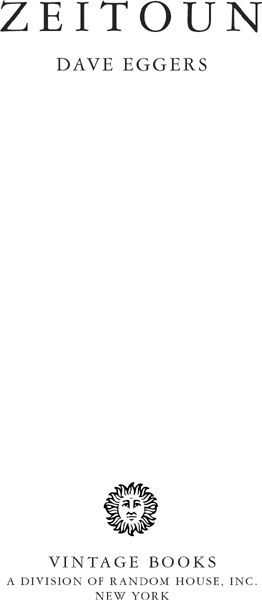DAVE EGGERS
ZEITOUN
Dave Eggers is the author of six previous books, including What Is the What, a finalist for the 2006 National Book Critics Circle Award and winner of Frances Prix Medici. That book, about Valentino Achak Deng, a survivor of the civil war in southern Sudan, gave birth to the Valentino Achak Deng Foundation, run by Mr. Deng and dedicated to building secondary schools in southern Sudan. Eggers is the founder and editor of McSweeneys, an independent publishing house based in San Francisco that produces books, an eponymous quarterly journal, a monthly magazine (The Believer), and Wholphin, a quarterly DVD of short films and documentaries. In 2002, with Nnive Calegari he cofounded 826 Valencia, a nonprofit writing and tutoring center for youth in the Mission District of San Francisco. Local communities have since opened sister 826 centers in Chicago, Los Angeles, Brooklyn, Ann Arbor, Seattle, Boston, and Washington, D.C. In 2004, Eggers taught at the University of CaliforniaBerkeley Graduate School of Journalism, and there, with Dr. Lola Vollen, he cofounded Voice of Witness, a series of books using oral history to illuminate human rights crises around the world. A native of Chicago, Eggers graduated from the University of Illinois with a degree in journalism. He now lives in the San Francisco Bay Area with his wife and two children.
www.zeitounfoundation.org
www.voiceofwitness.org
www.valentinoachakdeng.org
www.826national.org
www.mcsweeneys.net
ALSO BY DAVE EGGERS
Memoir
A Heartbreaking Work of Staggering Genius
Fiction
You Shall Know Our Velocity!
How We Are Hungry
How the Water Feels to the Fishes
What Is the What
The Wild Things
Nonfiction
Teachers Have It Easy: The Big Sacrifices and Small Salaries of Americas Teachers (with Nnive Calegari and Daniel Moulthrop)
As Editor
The Best American Nonrequired Reading
Surviving Justice: Americas Wrongfully Convicted and Exonerated (with Lola Vollen)
All author proceeds from this book go to the Zeitoun Foundation, dedicated to rebuilding New Orleans and fostering interfaith understanding.
www.zeitounfoundation.org
For Abdulrahman, Kathy, Zachary, Nademah,
Aisha, Safiya, and Ahmad in New Orleans
For Ahmad, Antonia, Lutfi, and Laila in Mlaga
For Kousay, Nada, Mahmoud, Zakiya, Luay, Eman, Fahzia,
Fatimah, Aisha, Munah, Nasibah,
and all the Zeitouns of Jableh, Lattakia,
and Arwad Island
For the people of New Orleans
Contents
Chapter 1
Chapter 2
Chapter 3
Chapter 4
Chapter 5
Chapter 6
Chapter 7
Chapter 8
Chapter 9
Chapter 10
Chapter 11
Chapter 12
Chapter 13
Chapter 14
Chapter 15
Chapter 16
Chapter 17
Chapter 18
Chapter 19
Chapter 20
Chapter 21
Chapter 22
Chapter 23
Chapter 24
Chapter 25
Chapter 26
Chapter 27
Chapter 28
Chapter 29
Chapter 30
Chapter 31
Chapter 32
Chapter 33
Chapter 34
Chapter 35
Chapter 36
Chapter 37
Chapter 38
Chapter 39
Chapter 40
Chapter 41
Chapter 42
Chapter 43
Chapter 44
Chapter 45
Chapter 46
Chapter 47
in the history of the world it might even be that there was more punishment than crime
Cormac McCarthy, The Road
To a man with a hammer, everything looks like a nail.
Mark Twain
NOTES ABOUT THIS BOOK
This is a work of nonfiction, based primarily on the accounts of Abdulrahman and Kathy Zeitoun (pronounced Zay-toon). Dates, times, locations, and other facts have been confirmed by independent sources and the historical record. Conversations have been recounted as best as can be remembered by the participants. Some names have been changed.
This book does not attempt to be an all-encompassing book about New Orleans or Hurricane Katrina. It is only an account of one familys experiences before and after the storm. It was written with the full participation of the Zeitoun family, and reflects their view of the events.
I
FRIDAY AUGUST 26, 2005
On moonless nights the men and boys of Jableh, a dusty fishing town on the coast of Syria, would gather their lanterns and set out in their quietest boats. Five or six small craft, two or three fishermen in each. A mile out, they would arrange the boats in a circle on the black sea, drop their nets, and, holding their lanterns over the water, they would approximate the moon.
The fish, sardines, would begin gathering soon after, a slow mass of silver rising from below. The fish were attracted to plankton, and the plankton were attracted to the light. They would begin to circle, a chain linked loosely, and over the next hour their numbers would grow. The black gaps between silver links would close until the fishermen could see, below, a solid mass of silver spinning.
Abdulrahman Zeitoun was only thirteen when he began fishing for sardines this way, a method called lampara, borrowed from the Italians. He had waited years to join the men and teenagers on the night boats, and hed spent those years asking questions. Why only on moonless nights? Because, his brother Ahmad said, on moon-filled nights the plankton would be visible everywhere, spread out all over the sea, and the sardines could see and eat the glowing organisms with ease. But without a moon the men could make their own, and could bring the sardines to the surface in stunning concentrations. You have to see it, Ahmad told his little brother. Youve never seen anything like this.
And when Abdulrahman first witnessed the sardines circling in the black he could not believe the sight, the beauty of the undulating silver orb below the white and gold lantern light. He said nothing, and the other fishermen were careful to be quiet, too, paddling without motors, lest they scare away the catch. They would whisper over the sea, telling jokes and talking about women and girls as they watched the fish rise and spin beneath them. A few hours later, once the sardines were ready, tens of thousands of them glistening in the refracted light, the fishermen would cinch the net and haul them in.
They would motor back to the shore and bring the sardines to the fish broker in the market before dawn. He would pay the men and boys, and would then sell the fish all over western SyriaLattakia, Baniyas, Damascus. The fishermen would split the money, with Abdulrahman and Ahmad bringing their share home. Their father had passed away the year before and their mother was of fragile health and mind, so all funds they earned fishing went toward the welfare of the house they shared with ten siblings.
Abdulrahman and Ahmad didnt care much about the money, though. They would have done it for free.
Thirty-four years later and thousands of miles west, Abdulrahman Zeitoun was in bed on a Friday morning, slowly leaving the moonless Jableh night, a tattered memory of it caught in a morning dream. He was in his home in New Orleans and beside him he could hear his wife Kathy breathing, her exhalations not unlike the shushing of water against the hull of a wooden boat. Otherwise the house was silent. He knew it was near six oclock, and the peace would not last. The morning light usually woke the kids once it reached their second-story windows. One of the four would open his or her eyes, and from there the movements were brisk, the house quickly growing loud. With one child awake, it was impossible to keep the other three in bed.


